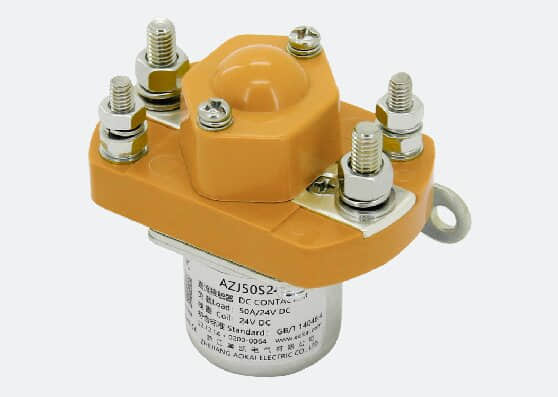- Home
- Product
- Solution
- About
- Download
- Glossary
- News
- Contact Us
- language

A DC contactor is one of the indispensable components of an electrical system, which plays a vital role in controlling the switching of electric current and protecting circuits. As an electrical switching device, DC contactors are manufactured and applied in a wide range of fields, from home applications to industrial automation. In this paper, we will take an in-depth look at the working principle, manufacturing process and applications of DC contactors in various fields.
Priority part: the working principle of DC contactor
A DC contactor is an electronic switching device used to control current and its working principle is based on electromagnetic suction. When an electric current is passed in an external circuit, the coil inside the DC contactor generates a magnetic field, and this field attracts the movable parts inside the contactor, causing it to close or break the circuit. This principle of operation allows DC contactors to perform high-energy current control in circuits, thus realizing various functions of electrical systems.
Part II: Manufacturing Process of DC Contactors
The manufacturing of DC contactors requires high-precision processes and materials to ensure reliability and long life. The manufacturing process usually includes the following steps:
Material selection: The main components of a DC contactor include coils, contacts, springs, and so on. Selection of high quality materials is critical to the performance of the contactor.
Manufacturing the coil: The coil is one of the core components of a DC contactor and it is usually wound from conductive material. The coil winding process requires highly sophisticated machines and techniques.
Manufacture of contact points: Contact points are usually made of electrically conductive materials to ensure good conductivity of the current path. Manufacturing of contacts requires high temperature treatment and precision machining.
Assembly: The coils, contacts and other components are assembled together to form a complete DC contactor. The assembly process requires precise process control to ensure contactor performance and reliability.
Part III: DC contactors in various fields of application
DC contactors have a wide range of applications in various fields, including but not limited to the following:
Industrial automation: DC contactors are commonly used to control circuits in industrial machinery and automation systems, such as controlling robots, conveyor belts and production lines.
Power systems: In power systems, DC contactors are used to protect circuits, switch power supplies and control important equipment such as generators.
Household appliances: DC contactors are also commonly used in household appliances such as refrigerators, washing machines and microwave ovens to control the switching and protection of circuits.
Automotive industry: Electrical systems in automobiles require various types of DC contactors to control lights, engines and other electronic devices.
Part IV: The future development of DC contactors
As technology continues to develop and electrical systems evolve, DC contactors continue to innovate and improve. Here are some of the trends for the future development of DC contactors:
Intelligent control: with the rise of the Internet of Things (IoT), DC contactors will be more integrated with intelligent systems for remote monitoring and automated control. This will increase the efficiency and manageability of electrical systems.
Energy-efficient and environmentally friendly: DC contactor manufacturers will aim to develop more energy-efficient and environmentally friendly products to meet the requirements of sustainable development. This may include the use of energy-high energy materials and designs to reduce energy waste.
High-performance materials: Advances in materials science will help develop more durable and high-performance DC contactors, increasing their reliability in harsh environments.
Miniaturization and Integration: As technology advances, DC contactors may become smaller and easier to integrate into compact electronic devices, driving innovation in electronic product design.
Conclusion
As a key component in electrical systems, DC contactors are important for their operating principles, manufacturing processes, and application areas. Understanding the principles and applications of DC contactors contributes to a better understanding of how modern electrical systems operate and also emphasizes their indispensability in various fields. Through continuous research and innovation, DC contactors will continue to play an important role in the field of electrical engineering and drive the continuous advancement of technology.
